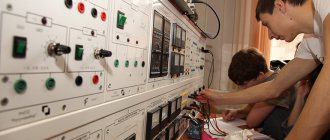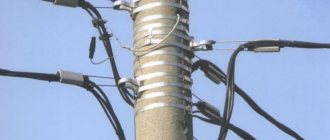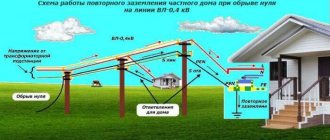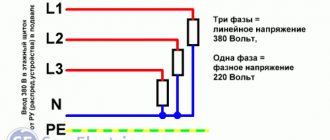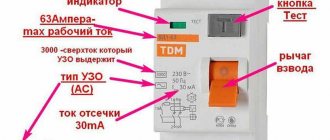In the life of every person, at one stage or another in life, the question of choosing a profession arises. This article is dedicated to those who, from many different areas of activity, have chosen the profession of an electrician. How to become an electrician? We will try to answer this question by considering all aspects of this profession.
A few words about making the right choice
Many people have shown interest in this profession since their school years. Some followed in the footsteps of relatives, while others simply like everything related to electricity - there are many options. You can always master this area of activity, like any profession. Not all electricians became electricians from the very beginning; for many people, the electrician profession may be their second, third, etc. in life, depending on the circumstances.
But in any case, an electrician is not just a person who has received an education, he is a person whose soul lies in this profession, for whom being an electrician is not just a job, but a part of life. That is, one should not consider the profession of an electrician solely as a way to earn money; nothing good will come of it. It is necessary to choose this direction of activity only if you really feel like it.
So, if you still decide to become an electrician, then the very first stage is choosing a specialization. This could be the profession of a power engineer at an energy supply company, servicing several distribution substations, an automotive electrician at a car service station, working in a private organization providing various electrical installation services - there are quite a lot of options, it all depends on local conditions, the prospects and prestige of the work at that or another enterprise.
Getting an education
In order to work in a particular profession, you must have not only knowledge, but also an appropriate document indicating the presence of the appropriate skills. Therefore, in the question of how to become an electrician, one of the most important stages is obtaining the appropriate education at an educational institution.
Of course, if you plan to work as an electrician for yourself, then having a diploma does not matter; in this case, knowledge and skills in carrying out work are important. But a novice electrician who has neither knowledge nor experience needs to start somewhere, and the starting point in this case will be working as an electrician at an enterprise. That is, you need to get an education in any case, since without a diploma they will not hire you for any enterprise.
In addition, studying at an educational institution allows you to gain basic theoretical knowledge in the electrical field, as well as the first practical skills in carrying out the work that the chosen specialty provides. It is impossible to learn all the information regarding the chosen direction during your studies at an educational institution, but a foundation of knowledge, a foundation, will be laid.
Each enterprise has its own nuances and peculiarities of work, and immediately after studying you will not be allowed to carry out work independently. Therefore, to obtain permission to work, it will be necessary to undergo appropriate training and knowledge testing.
Gaining practical skills
Most accomplished electricians received their first practical skills while working in their specialty at an enterprise. A novice electrician begins to perform his first work, applies and analyzes previously acquired knowledge. Communication with experienced workers and joint work allows you to accumulate your personal experience, acquire the necessary practical skills, and learn to apply your knowledge in practice.
The profession of an electrician is very dangerous and responsible, since the worker deals with such a dangerous phenomenon as electricity and maintains various equipment, which can cost from tens of thousands to several millions. Therefore, when working at the enterprise, special attention is paid to safety when performing work, and special emphasis is placed on responsibility, accuracy, discipline and diligence.
Thus, after working at an enterprise, an electrician not only acquires the necessary experience and practical skills, but also develops the qualities that a successful electrician should have.
Prospects for working as an electrician
The profession of an electrician is very versatile. There are many different areas of activity that are related to electricity. Some people work directly with electrical equipment - they install, operate or repair it, others occupy management positions or work as engineers mainly in the office, carrying out various calculations, analysis, and design.
Each of the specialties is irreplaceable, in this case there are no bad or good specialties - they, in general, constitute an integral working mechanism in which the links are interconnected and each of them performs its functions.
Considering the question of how to become an electrician requires perspective. Set a goal, not just master a certain direction, but strive for career growth. The main thing is to make the right choice, weigh the pros and cons of the chosen direction.
Or you can take a different path, working for yourself. When you have the necessary knowledge and experience in carrying out the work, you can provide services for electrical installation work. In the future, you can open your own company, hire specialists and provide electrician services, no longer taking small orders, but implementing large-scale projects at various enterprises.
Self-study
Self-study of a profession, in this case one of the areas of activity related to electrical engineering, involves obtaining theoretical and practical skills on your own. In modern conditions, with the presence of the Internet, anyone has access to a lot of information, articles, books, training courses that allow them to master any specialty.
But one should take into account the fact that self-learning is a rather complex process and requires proper self-organization, which is a big problem for many people.
Also, if you want to master a specialty through self-study, you should take into account that electricity and energy are a rather complex subject and many things cannot be mastered without outside help or explanation of the material by experienced specialists.
When learning on your own, you can misunderstand certain things, which in the future, when applying this knowledge in practice, can lead to gross mistakes, which, in turn, will lead to equipment damage or other negative consequences.
Therefore, you should not assume that you can easily master the profession of an electrician on your own. Self-education is important, but it will only be useful if there is a certain knowledge base, for example, acquired while studying at an educational institution.
In general, the nature of the electrician’s profession is such that he has to constantly study, learn new things, and improve his skills. That is, constant self-training for an electrician is an integral part of his work.
Read also: Hair dryer for soldering microcircuits review
Mention should also be made of correspondence courses in educational institutions. This method of teaching students is, in fact, self-study, since the student must study most of the material on his own. Correspondence education has a number of advantages compared to self-organized training.
First of all, this is the organization of the educational process - the training procedure developed by specialists and proven over the years, the amount of information studied. The second advantage is the availability of the necessary literature and equipment for conducting practical classes. Students are read the material in a condensed form, given practical exercises on the equipment, and given assignments and literature for self-study.
When following all the recommendations and studying the necessary material, the student receives the necessary knowledge base and the corresponding document on receipt of education. In the case of self-organization of the learning process, there will be neither a corresponding document on education nor the necessary knowledge base in such a volume as with distance learning.
Studying by correspondence is also good because the student has the opportunity to consult with experienced specialists and find answers to controversial issues. Testing knowledge in an educational institution allows you to assess the level of knowledge and, if necessary, find weaknesses or correct misconceptions about certain issues in electrical engineering.
The most important thing in this case is to find a good educational institution where you can really get knowledge, and not just a diploma.
In conclusion, we can conclude that in order to become an electrician, it is not enough to take a certain training course or simply receive the appropriate education. In order to become a good specialist, you need to gain not only theoretical knowledge, but also practical knowledge. As in any profession, theoretical knowledge that is not supported by experience means nothing.
In the course of his work, an electrician always learns something new, improves his skills, and makes responsible decisions. We should also not forget that the profession of an electrician is very dangerous when it comes to working directly with electrical equipment, electrical wiring, etc. Therefore, if you understand the dangers of working with electricity, are ready to study and practice a lot and, most importantly, have the desire, then you can become an electrician.
It is impossible to imagine life without electricity, and therefore without an electrician. But how to become an electrician from scratch, what do you need to know? Let's find out!
Since the days of oil lanterns and candelabra with candles have passed, people have become dependent on electricity.
At the city level, the problem of power outages is more frightening—shops, businesses, train stations, and airports cease to function.
Types of profession
The specialty of an electrician provides a fairly wide range of responsibilities and work performed in a wide variety of industries.
Among these areas it is worth highlighting:
- Electricians - install electrical wiring and other electrical equipment in both low-voltage and high-voltage networks.
Installation work
- Operating personnel - monitors the condition and operating modes of electrical equipment, interacts between various electrical installations and even parts of the power system.
- Electricians who set up and test equipment before commissioning and during power supply.
Equipment setup
- Electronic engineers - work with electronic circuits, including modern equipment (computers, servers, etc.), and solder radio components.
Working with electronic circuits
- Auditors - analyze energy consumption and consumption, develop effective measures to reduce losses, etc.
This list defines only the main areas; in practice, there are applications depending on the relevant industry: auto electricians, network engineers, substation workers, railway electricians, electricians servicing automation and telemechanics systems, relay protection, specializing in household networks, etc.
Network maintenance
In relation to each specific production or job, the responsibilities of an electrician and the amount of knowledge required of him are determined by local instructions and regulations.
To become an electrician, you first need to determine the direction you are interested in and the relevant features of the work.
In each of them there is a certain gradation according to:
- professions (electrician, electrician, electrician, engineer, etc.);
- qualification categories or categories on which the electrician’s salary and the list of work acceptable for performance in terms of technical and technological complexity and responsibility directly depend;
- clearance level - determines the compliance of the employee’s knowledge and skills in terms of labor protection and electrical safety, which are necessarily taken into account when servicing devices and determine the possibility of performing certain categories of work.
To become a professional electrician, you must obtain the appropriate level of knowledge in this profession, which is confirmed by some document. After this, training takes place on electrical safety issues and technical operating rules to assign a qualification group.
The first thing you need to become an electrician is to master the appropriate amount of knowledge. You must learn to navigate basic electrical quantities, operating principles of elementary circuits, and radio components. You also need to understand the laws of electric current flow, voltage transmission, etc.
In relation to the chosen profession, it is necessary to study the relevant literature or take a course according to the educational institution’s program.
If you decide to become an experienced electrician, then training at a specialized institution will not hurt you. Today, many universities, technical schools and colleges provide vocational education for electricians in various areas.
Let's look at the features of training courses for each of them:
- Higher educational institutions will require about 4 to 5 years of training from a beginning electrician. Compared to other types of institutions for training electricians, they provide a minimal practical base, but they prepare good specialists with deep theoretical knowledge in the electrical field. An important criterion is obtaining an 11th grade education or having a professional one that excludes such a need.
- Technical school represents the golden mean in terms of theoretical and practical skills that an electrician receives after graduation. Of course, the theory is not studied in such a detailed manner, but this is more than enough to produce competent electricians. Training can be carried out either after 9th grade for 4 years, or after 11th grade for 3 years.
- College or school - prepares the working professions of electricians; as a rule, the theoretical part here is kept to a minimum, maximum emphasis is placed on acquiring practical skills. An electrician's license can be obtained fairly quickly - from 1 to 3 years.
The above training options provide the opportunity for both paid and free education. As a result, you receive a diploma or certificate of appropriate qualifications, and some institutions even take care of the employment of their graduates.
Of course, not all offers will exceed the average salary, but this will be an excellent platform for practical consolidation of knowledge. A significant disadvantage is the rather lengthy process to become an electrician.
Professional courses for electricians have become especially popular in the modern world, where the constant development of the labor market creates constant demand. Thanks to this, you can become an electrician in such special courses in 2 to 8 weeks.
Training can take place both online and offline, which greatly simplifies the process of mastering the profession of an electrician.
Depending on the specific course, you can take it either from a textbook or through webinars or conferences.
The disadvantage of training in courses is that the amount of information is rather small; a novice electrician receives exposure to the basics of electrical engineering and narrowly focused practical recommendations. Which he will be able to test directly in independent practice. In addition, courses are always offered on a paid basis.
A significant advantage is much greater freedom - to obtain a certificate, you can not leave another job or study and master the profession of an electrician in parallel. Also during the courses you will get a summary of what concerns a specific type of activity.
Self-study
If none of the above methods suits you, you can become an electrician yourself by studying the information you are interested in in the literature or on the Internet. Having joined the ranks of home craftsmen, you are unlikely to be able to perform any complex work, but installing wiring in an apartment or installing simple household equipment will be a clear and easily accomplished task for you.
To become an experienced self-study specialist, you will still need the help of a qualified specialist. It is advisable to work with practitioners, if there is an opportunity to be hired as an electrician’s assistant, at least for a nominal fee - this would be an ideal option.
At the initial stage, an apprentice electrician will be entrusted with the simplest operations (shaping walls, drilling holes, laying wires, well, bring it - give it), here it is important to carefully complete all the tasks and watch what your mentor is doing.
Wall chipping
After some time, you will be able to repeat the same work yourself without any problems.
It should be noted that being self-taught does not mean a bad electrician - lack of education, alas, is not a determining factor.
In practice, many specialists performing electrical installation work do not have any crusts at all, but even licensed companies and organizations can envy the quality of their work.
READ MORE: Why does the introductory machine, and not the group one, knock out when overloaded?
At the same time, even electrical technical personnel with higher and secondary technical education can show an unacceptably low level of knowledge and skills.
The main thing is to take a responsible approach to studying all the nuances - electricity does not forgive mistakes, remember, the priority of your safety and the health of others should come first.
What you need to do to become an electrician
To master the basic knowledge of “ electrician for beginners ”, first of all, you will need to choose one of the areas and concentrate all your efforts on it. The specialization of a novice electrician on this basis can be represented as follows:
- Working with high voltage circuits.
- Maintenance of low-voltage electrical lines (up to 1000 Volts).
- Repair of household distribution systems and equipment connected to them.
Important! A novice electrician can move on to mastering other areas only after certain successes have been demonstrated in one of these areas.
In each of them there is a certain differentiation according to the level of skill achieved by the novice worker. It is classified according to the following main characteristics:
- Profession rank (electrician, electrician or electrician, etc.).
- Assigned rank (category).
- An admission form that determines the specialist’s level of knowledge and ability to perform certain categories of work.
It will be possible to achieve one or another rank after the novice electrician masters the level established by the standards, confirmed by the relevant documents. After this, you will need to additionally master the rules for safe handling of electrical equipment. At the same time, the basics of operating electrical installations, as well as their electrical circuits, are studied, which is necessary for assigning one of the tolerance groups (from the second to the fourth).
Concepts and properties of electric current
Electrical laws and formulas are required not only for carrying out any calculations. They are also needed by those who practically perform operations related to electricity. Knowing the basics of electrical engineering, you can logically determine the cause of the malfunction and eliminate it very quickly.
The essence of electric current is the movement of charged particles that transfer electric charge from one point to another. However, with the random thermal movement of charged particles, following the example of free electrons in metals, charge transfer does not occur. The movement of electric charge through the cross section of a conductor occurs only if ions or electrons participate in ordered movement.
Electric current always flows in a certain direction. Its presence is indicated by specific signs:
- Heating a conductor through which current flows.
- Change in the chemical composition of a conductor under the influence of current.
- Exerting force on neighboring currents, magnetized bodies and neighboring currents.
Electric current can be direct or alternating. In the first case, all its parameters remain unchanged, and in the second, the polarity periodically changes from positive to negative. In each half-cycle, the direction of the electron flow changes. The rate of such periodic changes is frequency, measured in hertz
Where can an electrician work?
The profession requires different levels and types of training, as well as different categories of workers. For example, you can choose for yourself the vacancy of an electrician, electrical technician, circuit designer, electrical engineer and some others. All of them are somehow related to working with tension, but there are big differences between them.
An electrician or electrician may work primarily in private or government-owned enterprises. The tasks of his work will be the installation, testing and repair of sockets and electrical equipment, ensuring safety, preparing devices for operation, installing insulators and searching for possible faults with their subsequent elimination, as well as many other tasks.
Electrics - how I became an “electrician” - DRIVE2
I was like everyone else... but not for long.
A long time ago I lived “like everyone else,” with an old Soviet mechanical electric meter, 4 plugs and combined copper-aluminum wiring.
Despite the fact that at that time I did not distinguish the PVS wire from the VVGng cable, I already understood that all this was crap (because I saw otherwise in real life), but the only thing I could do then myself was screw a din rake in place of the plugs and put 4 ABB machine guns on it S.H.L. I was years old... ummm... I don’t remember, but I wasn’t 20.
A few years later, it was time for a routine replacement of the meter; it had served its purpose, which my electricity supplier kindly notified me about.
In the hallway, on the occasion of removing the old built-in wardrobe, I was just carrying out renovations; together with the meter, I decided to change the input machine on the floor, the old input cable, as well as the panel itself in the apartment and part of the wiring. The local housing and communal services redneck electrician was officially called in to carry out this work. “I need it to be really good and of high quality, so that there is a reserve for the future,” I said.
- “Yes, yes, of course, 5000 rubles for the work and I will do everything at the highest level” (let me remind you, the rate then was ~30 rubles)
- And he began to “do”...
Full size
It was he who laid the new input and connected it to the old switchboard.
And here is the final result of his “intense” work.
He used an ax to cut a groove for the input (naturally a garage PVS 3x4), a hole in the wall for an ABB Europa overhead electrical panel (24 modules), used three of my old machines for socket groups and a washing machine, added a 2-pole input, screwed a meter into the panel through the ass which is not intended for such switchboards (it is for a control room with a mounting panel!).
He screwed it all up, naturally, with some kind of nasty monowire (it bent very badly, which means there was more iron than copper), because the only tools he had were pliers, a screwdriver and a segment knife, i.e. he didn’t have a tool . At the same time, I came up with the only RCD in the panel back then, for a washing machine, although I still understood little about them.
And for such “work” 5k (almost $200) of materials separately. If this is good, then what is bad?!
Well, I wasn’t worried about myself, the electrician just had to stay with me after that “work,” and to be fair, I’ll note that in the end he atoned for his guilt. Well, what about the rest? No way! He continued to walk around and rob all sorts of pensioners and residents of the house who did not understand anything, doing the simplest operations for crazy money, while ruining everything around him, and simultaneously running away from me.
If you don’t do it yourself, no one will do it.
The main problem is that I understood the principles of power supply to the apartment, but “in my own way”, because I grew up on BS 7671 (English “PUE”), which here in Russia is completely useless due to the use of type G “English” (BS 1363) plugs and sockets , which, by the way, can safely be called the most thoughtful in the world.
Therefore, the European non-phasing type F plugs/sockets that we use here have always seemed like nonsense to me (and they are nonsense!), just like all this electrical equipment that we are forced to fence around here because of them.
Yes, yes, it is for this very reason that any electrical installation here is expensive and overcomplicated, while the wise British can actually assemble panels using “3 machines” and don’t worry about it at all. I will definitely talk about this in future articles, but now let’s get back to the topic...
BS 7671 - 17th edition.
- PUE - 7th.
You felt it, right? Exactly.
In short, I got used to our electrics and began to put in order what the “professional” did for me. Here is the same shield, with my amendments.
So to speak, I “trained”, realizing that all this had to be torn to hell and redone normally.
Fill up the holes in the wall and buy a hinged panel again because there is nowhere to put a built-in one, and this one is already ruined. Change the input again, this time to normal non-flammable.
The counter is for the one that fits on a din rake. Well, with automation, as you can see, I started right away with the right one - ABB S and F series.
I slowly started buying instruments. It’s funny but true - just by buying my first crimp and various NShVI tips, I have already become “cooler” than half of the electricians. They don’t, never have, and never will.
To be honest, I didn’t think then that I would collect something for someone, write articles, etc. But the “topic” itself began to haunt me, because 80% of the city’s electricians are rednecks, and generally 90-99% in the countryside. As a result, everyone who knew me (and even didn’t know me) began to seek advice.
READ MORE: How much cement is needed for 1 m3 of concrete in kilogram bags
This, in turn, led to me starting to collect simple budget panels for all sorts of dachas. Then my version of the simplest dacha panel was born, in which no one can spoil anything with their crooked hands: Electrical panel for a dacha/garage - clear, simple, for everyone.
Here it is, the first “prototype” of a fool-proof and simple-as-two-kopecks dacha shield, a couple of years ago.
Then, naturally, the shields became bigger and bigger, and little by little, without noticing it, they crawled onto the apartment ones. The reason for this is that I always tried to do everything RIGHT. It is important to understand what is correct... Correct is when everything necessary is done for each specific situation. T.
That is, I am not guided by any ready-made templates, but develop the optimal solution for each object.
I’m not one of those sick senile people who will foam at the mouth for something that can only be assembled on top-end ABB, and only 150 modules, no matter where, but naturally I’m not one of those who crookedly connected three Chinese machines with a monowire, saying that This is how we used to live for years.
For some reason, many people believe that if the electrics are inexpensive, then they can do it somehow. This is completely wrong.
- And let the correct example be my own electrical panel, from the article: Electrical panel for an apartment/private house - advanced
- Here it is, mounted and working.
- My recommendations:
If they do it to you...When they do something to you, no matter what it is, be sure to study this process yourself, at least superficially, especially if these are things that will then be extremely difficult (even impossible) to correct.
It's one thing for you to mess with external wiring at your dacha, it's not a problem if you notice and fix it in time, it's just wasted money and nerves. But if they lay crap in your apartment during a major renovation and roll it all under plaster... It will be fun to do half of the renovation again.
It just hit… well, 500k for example. Little things, right?)))
If the technical question asked is “why exactly?” you heard the phrase “I always do this” from a certain specialist - a kick in the ass, without further conversation. This is at the level of “why?” the answer is “by the head of cabbage.” There is no “this is how I do it”; there are specific technologies, standards, and recommendations; this is a sure sign of handicraft.
If you do it yourself...Remember that in an apartment building you are responsible not only for yourself, but also for others. Burn down your home - no problem.
The trouble is when the top ones have to make repairs because they “melted” because of you, and the bottom ones because they were flooded during extinguishing.
This is how you can accumulate debts on the price of your own apartment, so think twice before going anywhere on your own, especially if you really don’t know anything and don’t have at least general skills in working with any kind of electrical equipment.
If you have a private house, the situation is a little different, here in Russia it’s every man for himself. You can do everything yourself, the result is again yours.
Redneck electricians should absolutely not be paid, this is the only way to kill them.
Any attempt to save on electrics will backfire... There is no need to confuse a reasonable minimum and savings, so that everything suddenly becomes cheaper out of some fright.
If you don’t have money, you absolutely shouldn’t try to save, because there’s nothing to fix later.
The very fact of trying to save money leads to the fact that everything starts to be done somehow, just to be cheaper, which ultimately saves only 20% of money with an 80% loss in quality. Yes, yes, it’s that same damned 80/20 rule again, it works here too.
In the article about wiring, I will write about this in detail, with numbers and evidence that only high-quality, correctly made wiring is the cheapest. Only this way and no other way, you can’t fool the numbers.
Want like you!
I am a bad example, because even my profession by education... sounds long, but in short - car service. The fact that I have to understand industrial electrical engineering is how it should be. In addition, for many years I have been a professional modeler, where, again, ultra-high-precision electrics are the basis of everything (there they have long since done away with internal combustion engines). Example with pictures, otherwise people asked in the comments...
This cute carbon-kevlar catamaran, 1.1 meters long, set an absolute Russian speed record in its class - 155 km/h.
Here are its engines - LMT 1950 LK, with hybrid air-water cooling. The rotor is cooled by air, and the stator is cooled by water. Under load, these babies spin up to 46,000 rpm and are capable of consuming over 5,000 watts each.
Here are their dimensions so you can just imagine their size...
But the split gold-plated connectors soldered onto them by me are almost as thick as a little finger and rated at 200A.
If, with such power, you make a mistake and do something wrong, it will all be sealed off instantly and there will be a good fire, costing a couple of hundred thousand rubles. These are very expensive mistakes, so you simply cannot make mistakes.
Those. The fact that I am friends with household electrics in particular is not surprising. It would be surprising if it were just the opposite.))) So if you try to repeat after me, keep in mind that all this did not come out of nowhere and if you want it just like me, you will have to spend at least a year on training.
READ MORE: Standardized air exchange rate in industrial premises. Ventilation standards in various rooms
Am I an electrician?
Electrician training
Education can be obtained by studying at one of the colleges, technical schools or universities.
In Moscow, higher education can be obtained at the following universities:
- Moscow State Technical University named after. Bauman;
- National Research University;
- Moscow Automobile and Highway State Technical University.
Education can also be obtained by studying not only on full-time or part-time courses, but also remotely. Many universities now widely offer this form of training.
After 9th or 11th grade, a student can enter a college or technical school. This could be an electrical installation technical school or an automotive college.
At the university, education lasts from 4 (bachelor's) to 6 years (master's), depending on the choice of the student. In college and technical school, training can take from 3 to 5 years - the duration depends on the specialty and form of study.
Basic current quantities
When an electric current occurs in a circuit, a constant charge transfer occurs through the cross section of the conductor. The amount of charge transferred in a certain unit of time is called current, measured in amperes.
In order to create and maintain the movement of charged particles, it is necessary to have a force applied to them in a certain direction. If this action stops, the flow of electric current also stops. This force is called the electric field; it is also known as electric field strength.
It is this that causes a potential difference or voltage at the ends of the conductor and gives impetus to the movement of charged particles. To measure this value, a special unit is used - volts. There is a certain relationship between the basic quantities, reflected in Ohm's law, which will be discussed in detail.
The most important characteristic of a conductor directly related to electric current is resistance, measured in ohms. This value is a kind of resistance of the conductor to the flow of electric current in it. As a result of the influence of resistance, the conductor heats up. As the length of the conductor increases and its cross-section decreases, the resistance value increases. A value of 1 ohm occurs when the potential difference in the conductor is 1 V and the current is 1 A.
Where to begin?
Acquaintance with the necessary amount of knowledge will help a novice electrician to decide where to start mastering the profession. It should be sufficient to:
- be able to navigate well in the whole variety of electrical quantities and their units of measurement;
- understand electrical equipment operating as part of power supply systems;
- understand the operating principles of simple electrical circuits, as well as their constituent components.
In addition, a novice electrician needs to study and master the basic laws relating to the flow of current through linear circuits and the transmission of voltage through them. And in relation to the future profession, you will need to study special technical literature or go through the full cycle according to the program of the chosen institution.
How to become an electrician from scratch
Today, given the high level of development of the construction industry, many different construction companies have appeared that provide their services in the field of construction and repair.
But such companies cannot exist without qualified workers, such as, for example, electricians. Without electricians, it is impossible to perform a large number of works, such as electrical wiring, connecting heated floors, electrical appliances, and more. A qualified electrician is a profession in demand today. To get it, you can go to a specialized educational institution or take an electrician course.
Some may consider this profession not prestigious, but the profession of an electrician has a number of advantages, including:
- Constant profit. Today, plumbers are highly sought-after specialists whose work is paid quite highly.
- Knowledge and skills will be useful in life.
- Experts say that the profession of an electrician is quite interesting and exciting.
- Constant living common.
- There is an opportunity to work for yourself.
- The more work experience a specialist has, the higher the job is paid.
The work of an electrician is very responsible and requires certain knowledge. In order to become one, you need:
- Get a secondary education.
- It is imperative to undergo specialized professional training and gain certain skills in the job.
- Complete the internship.
- After you have completed your internship and received a certificate, you need to obtain a work permit. To obtain a permit, you must also pass certain tests and practical tasks.
In order to become an electrician, you can take specialized courses. In these courses, all theoretical and practical classes are conducted exclusively by specialists, professionals, with skills and experience.
If the activities of the company that recruits for the courses are legalized, then after completing them the organization has the right to issue a certificate and work permit, and in some cases, even offer further employment.
Price issue
Another advantage of being an electrician is the relatively high level of wages. Some large enterprises pay high salaries (more than 100 thousand rubles) to representatives of this specialization. But if we take the average figure for the country, it is 60,200 rubles.
Electrical engineers are more in demand than electrical fitters. The former receive on average 11 thousand rubles more than the latter. The highest salaries are observed in large metropolitan areas. There the lower limit is 50 thousand rubles. For example, the average in Moscow and St. Petersburg is about 75 thousand rubles per month, in Krasnodar and Krasnoyarsk - 63 thousand rubles. But in the regions, the salary range varies from 33 to 41 thousand rubles.
Found a violation? Report content
Ohm's law
This law relates to the basic provisions and concepts of electrical engineering. It most accurately reflects the relationship between quantities such as current, voltage, resistance and power. The definitions of these quantities have already been considered; now it is necessary to establish the degree of their interaction and influence on each other.
In order to calculate this or that value, you must use the following formulas:
- Current strength: I = U/R (amps).
- Voltage: U = I x R (volts).
- Resistance: R = U/I (ohm).
The dependence of these quantities, for a better understanding of the essence of the processes, is often compared with hydraulic characteristics. For example, at the bottom of a tank filled with water, a valve with a pipe adjacent to it is installed. When the valve opens, water begins to flow because there is a difference between the high pressure at the beginning of the pipe and the low pressure at the end.
The current strength can be compared with the water flow, that is, the amount of water flowing through the cross-section of the pipe over a set period of time. As the pipe diameter decreases, the water flow will also decrease due to increased resistance. This limited flow can be compared to the electrical resistance of a conductor, which keeps the flow of electrons within certain limits.
Career growth and development
To become an electrical engineer, you need to obtain a college degree. The same applies to those who want to work as an electrical engineer, electromechanic or high-level specialist. The difference between them is small. In other cases, higher education is not required.
Therefore, for people who have received specialized secondary education or are working from scratch, there is an opportunity to improve their qualifications and thereby increase their salaries.
For those who already have a higher education, there is always a chance to improve their rank.
This way you can get a job as a production manager or manager of an enterprise or workshop.
Energy and power in electrical engineering
It is understandable that people of any age want to understand a science such as electrical engineering. The basics of electrical engineering will help with this for all beginners. A lot of materials are published on the Internet and in print, often under the title “Electrical engineering for dummies.” You need to start by mastering the provisions and laws of electricity.
Electrical Engineering Textbook
In electrical engineering, there are also such concepts as energy and power associated with Ohm’s law. Energy itself exists in mechanical, thermal, nuclear and electrical forms. According to the law of conservation of energy, it cannot be destroyed or created. It can only be transformed from one form to another. For example, audio systems convert electrical energy into sound and heat.
Any electrical appliance consumes a certain amount of energy over a set period of time. This value is individual for each device and represents power, that is, the amount of energy that a particular device can consume. This parameter is calculated using the formula P = I x U, the unit of measurement is the watt. It means moving one ampere by one volt through a resistance of one ohm.
Thus, the basics of electrical engineering for beginners will help you understand the basic concepts and terms at first. After this, it will be much easier to use the acquired knowledge in practice.
Advantages and disadvantages of the specialty
As they gain experience and grow professionally, electricians can earn quite good money. These specialists are in demand in any region or city.
Among the absolute advantages are the following:
- possibility of additional employment and part-time work;
- good salary;
- demand in the labor market in any country;
- opportunity for career growth;
- convenient work schedule.
Among the shortcomings are the following:
- very responsible and dangerous work;
- work at height possible;
- Some regions may have low wages.
There are many more pros than cons. Therefore, many young people choose a career as an electrician, knowing that they will not be left without work.
College of Science and Technology (CAO)
The College of Science and Technology has all the conditions for successful study:
- classrooms with modern equipment;
- practicing teachers with extensive professional and pedagogical experience;
- Individually focused practical classes in small groups of up to 6 people.
Upon completion of their studies, graduates are awarded a standard certificate, and the college provides assistance in finding employment.
Duration of training is 1 month.
Training Center (CAO)
Experienced teachers of the center will help you master all the necessary and important concepts, show you in practice how to properly work with cable power lines, carry out electrical repairs and much more.
Course duration: 40 ac. h.
Lesson mode:
Course curriculum:
- Introduction to electrical engineering course.
- Electricity of the net.
- Consumer transformer substations.
- Design and installation of electrical wiring.
- Wires and cables, technical requirements for electrical wires.
- Internal electrical wiring.
- Open electrical wiring with twisted single-core wires PRD, PRVD, APV, PV, APRI, PR.
- Open electrical wiring with flat wires APPV, PPV on rollers.
- Hidden electrical wiring with flat stranded wires.
- Technology for laying electrical wiring in steel and plastic pipes.
- Connection and termination of wires (copper and aluminum).
- Installation of switches and sockets.
- Installation of lamps.
- Electrical wiring in basements and attics.
- Installation of apartment panels (tools, fixtures, devices).
- Power lines (overhead, wires for overhead lines, supports and insulators).
- Branches from overhead lines to building inputs.
- Cable power lines.
- Organization of electrical network maintenance.
- Typical faults of electrical equipment and ways to eliminate them.
- Electrical installation devices.
- Lamps and incandescent lamps.
- Lamps with fluorescent lamps.
- Connecting cords and plugs.
- Apartment shields.
- Preventive testing of electrical wiring.
- Use and connection of electric pumps for water supply.
- Use of electrical energy for thermal purposes.
- Electrified tools and machines for repair and construction work.
- Safety regulations.
How in demand is the electrician profession now?
The answer to this question is quite simple: it is in demand and the level of demand for it is growing both in production and in everyday life.
In production, electricity becomes the main type of energy, gradually displacing compressed air and steam. Of no small importance is the digitalization of industrial equipment and the associated growth of various controllers, the operation of which requires a connection to the network.
At the everyday level, the demand for this profession is also stimulated by changes in our lives. It is advisable for a man, as the owner of a house, to have at least basic skills as a plumber, carpenter and electrician, which will be useful when correcting minor faults. But for large jobs it is better to invite specialists simply because, due to greater skill, knowledge of the specifics of the work and the availability of special tools, they will do this work faster and with better quality.
In relation to electricians, for example, it is advisable to repair a broken socket yourself, but it is better to invite a specialist to completely re-wire worn-out wiring during a major overhaul. Moreover, there are enough offers on the market to provide such and similar services at quite reasonable prices.
The demand for the work of an electrician directly follows from this simple rule, and the massive nature of the use of electricity in everyday life creates a steady demand for this activity.
If there is high demand, it is a good idea to master a profession by being self-taught, having only high school as a starting point. But it’s still better to take electrician courses. At the training center you will find short, intensive vocational training courses, certification, external studies, retraining, additional vocational education (DPE), and advanced training.
Professional Responsibilities
This profession is quite common in our country, and job descriptions are formed quite clearly:
- carrying out electrical wiring or power cables;
- connection of electrical equipment with preliminary calculation of cables;
- drawing up a plan for the electrification of industrial or residential premises;
- installation of new electrical networks, repair and dismantling of broken ones, etc.
The studied basics of electrics enable a specialist to install control or protection devices, insulators, mark out equipment installation points, troubleshoot short circuits, and lay cable ducts. And also measure the resistance of insulating materials, carry out preparatory work before turning on the mechanisms for the first time, install and dismantle alarm or protection systems, connect wires, cables, couplings, etc.
